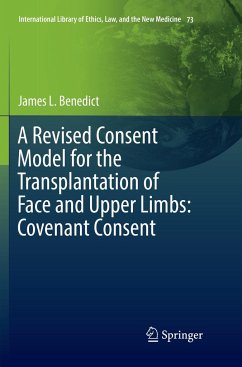
Dealing with Bioethical Issues in a Globalized World
Normativity in Bioethics
Herausgegeben: Gielen, Joris

PAYBACK Punkte
42 °P sammeln!
This book addresses the complexity of talking about normativity in bioethics within the context of contemporary multicultural and multi-religious society. It offers original contributions by specialists in bioethics exploring new ways of understanding normativity in bioethics. In bioethical publications and debates, the concept of normativity is often used without consideration of the difficulties surrounding it, whereas there are many competing claims for normativity within bioethics. Examples of such competing normative bioethical discourses can be perceived in variations and differences in ...
This book addresses the complexity of talking about normativity in bioethics within the context of contemporary multicultural and multi-religious society. It offers original contributions by specialists in bioethics exploring new ways of understanding normativity in bioethics. In bioethical publications and debates, the concept of normativity is often used without consideration of the difficulties surrounding it, whereas there are many competing claims for normativity within bioethics. Examples of such competing normative bioethical discourses can be perceived in variations and differences in bioethical arguments within individual religions, and the opposition between bioethical arguments from specific religions and arguments from bioethicists who do not claim religious allegiance. We also cannot merely assume that a Western understanding of normative bioethics will be unproblematic in bioethics in non-Western cultures and religions. Through an analysis of normativity in Christian, Hindu, Buddhist, Islamic, and Jewish bioethics, the book creates awareness of the complexity of normativity in bioethics. The book also covers normative bioethics outside an explicitly religiously committed context, and specific attention is paid to bioethics as an interdisciplinary endeavor. It reveals how normativity relates to empirical and global bioethics, which challenges it faces in bioethics in secular pluralistic society, and how to overcome these. By doing that, this book fills an important gap in bioethics literature.














